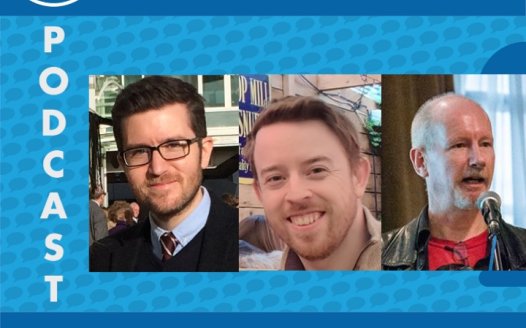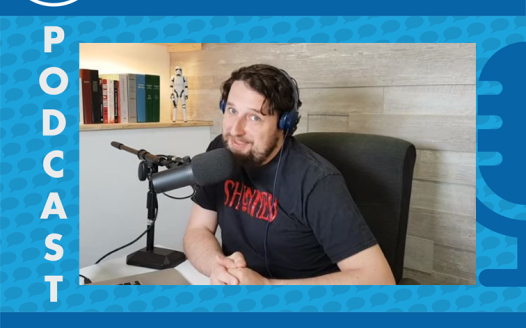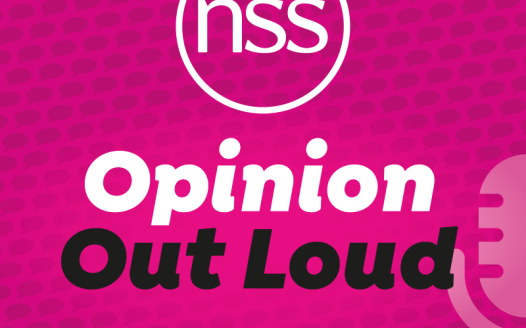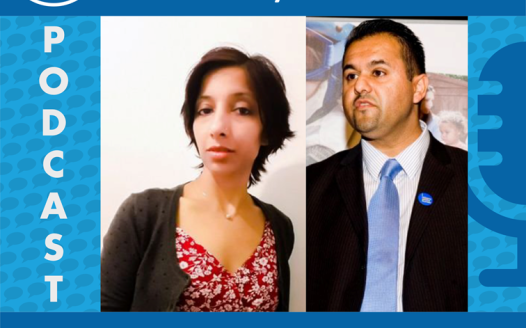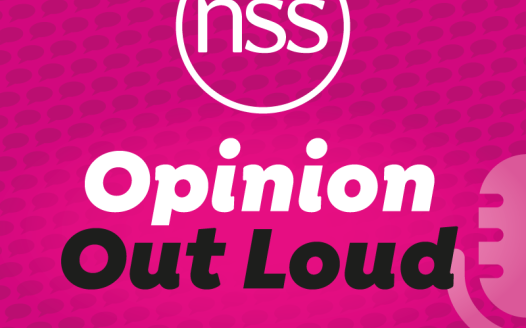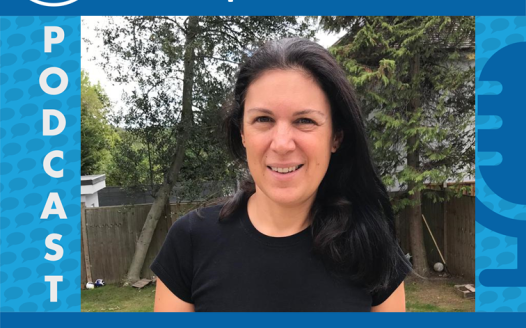Podcasts
Ep 49: The early history of secularism
Posted: Tue, 11th May 2021
The term 'secularism' was coined in 1851. But Britain's tradition of freethinkers, atheists and radicals goes back much further than that.
In this episode, Emma Park delves into the origins of secularism in the late eighteenth century, its rise to prominence in the mid-nineteenth century, its gradual separation from much of radical politics into the twentieth – and the link between radicalism, freethought, and shoemaking.
Three experts join Emma for a roundtable discussion: Matthew Kidd, a historian of nineteenth-century radicalism; Paul Fitzgerald, a.k.a. Polyp, who is writing a graphic novel about Thomas Paine; and Eoin Carter, whose PhD is on Richard Carlile.
Paine's criticism of organised religion in his Age of Reason made him unpopular in England, but heavily influenced Richard Carlile, a campaigner for press freedom who was imprisoned for blasphemy. Carlile in turn was a seminal figure in the burgeoning freethought and radical movements in which Charles Bradlaugh, future founder of the NSS, grew up. Secularism flourished among other radical movements in the mid-nineteenth century, but by the end was losing ground politically.
This podcast is designed to complement the NSS seminar on George Jacob Holyoake, led by biographer Ray Argyle, that was held at Conway Hall online on 22nd April.
Watch this episode on YouTube | Direct MP3 Link | Transcripts
Follow Emma on Twitter: @DrEmmaPark
Notes
- Inventing Secularism: The Radical Life of George Jacob Holyoake (Conway Hall)
- The renewal of radicalism: Politics, identity and ideology in England, 1867–1924, by Matthew Kidd
- Tom Paine's Bones – graphic novel project by Paul Fitzgerald
- Eoin Carter – Radical Politics and Popular Science in Britain, 1815–48
- The National Secular Society: The first 150 years, 1866-2016
Support the podcast, share with a friend, and leave a positive review everywhere you can.
Ep 48: Challenging the Jehovah's Witnesses
Posted: Thu, 29th Apr 2021
Lloyd Evans was an elder in the Jehovah's Witnesses, before he left the organisation in 2013. He has since been campaigning to expose its workings to the public.
In this episode, Lloyd speaks to Emma Park about the JWs' history and key beliefs, including their doctrine of refusing blood transfusions, and the practice of 'shunning' people who decide to renounce their religion. He discusses the ways in which the organisation is structured so as to facilitate the concealment of child abuse from external investigation.
Lloyd also argues that there is a pervasive deference to religion, both within the NHS and in British society more generally, that prevents the harm that can be caused by organisations like the JWs from being properly challenged.
Emma is then joined by the NSS's Megan Manson to reflect further on the JWs' influence over NHS policy through their 'hospital liaison committees'. The JWs arguably illustrate the problems with allowing 'the advancement of religion' to qualify an institution as a charity.
Watch this episode on YouTube | Direct MP3 Link | Transcripts
Follow Emma on Twitter: @DrEmmaPark
Notes
- NHS trusts' cosy relationships with Jehovah's Witness leaders could have tragic consequences
- Religious fundamentalists can't be trusted with child protection
- Frank Cranmer, 'Vicarious liability for rape: Barry Congregation of JWs'
- The Lloyd Evans Channel – ex-JW on YouTube
- Ian McEwan's The Children Act, reviewed by Emma Park
Support the podcast, share with a friend, and leave a positive review everywhere you can.
It's not too late to fulfil George Holyoake's secularist vision - Opinion Out Loud Ep 006
Posted: Tue, 20th Apr 2021
With secularist principles under siege across much of the world, it's worth reconsidering the vision of the man who coined the term 'secularism' in the 19th century, says his biographer Ray Argyle.
Ep 47: Blasphemy in the classroom – The Batley Grammar case
Posted: Tue, 13th Apr 2021
A Yorkshire secondary school recently decided to suspend and investigate a teacher for using a cartoon of the prophet Muhammad in an RE lesson on blasphemy, amid protests outside the school gates.
In this episode, Emma Park speaks to Fiyaz Mughal and Khadija Khan about the case.
Fiyaz Mughal is a British Muslim and director of Faith Matters, an organisation that works to resolve conflicts and strengthen relationships between faith communities. He explains why, as he wrote in the Spectator, the Batley protesters do not represent him. He and Emma discuss how material like the Charlie Hebdo cartoons or The Satanic Verses might be used in the classroom to enable pupils to see different points of view and make up their own minds. They then explore the reasons why liberal Muslims' views are often ignored by politicians and much of the media.
Khadija Khan, a journalist and commentator of Pakistani Muslim heritage, talks about the threat which a small number of Islamist extremists poses to freedom of speech in our society, and why this freedom is particularly important to those from minority communities. Khadija also describes her own experience of being threatened by extremists who wanted to silence her.
Finally, Emma is joined by the NSS's Stephen Evans to consider why freedom of expression and critical debate in the classroom are so important for secularists.
Watch this episode on YouTube | Direct MP3 Link | Transcripts
Notes
- Teacher suspended after using Muhammad cartoon in class on blasphemy
- The National Secular Society's letter to Batley Grammar School
- Fiyaz Mughal, 'The Batley protestors don't represent me', Spectator
- Khadija Khan, 'Lessons to Learn', sister-hood
- Kunwar Khuldune Shahid, 'Western liberals' weakness on blasphemy is letting down Muslim dissenters'
- Bob Forder, 'There is nothing new about cartoons which mock religion'
Support the podcast, share with a friend, and leave a positive review everywhere you can.
Any serious counter-extremism strategy should consider religious charities – Opinion Out Loud Ep 05
Posted: Tue, 6th Apr 2021
As a commission calls for action to tackle hateful extremism, Megan Manson says changes in the charity sector – including legal reform – would be both helpful and compatible with fundamental liberal principles.
Ep 46: Forced marriage and the importance of RSE
Posted: Tue, 30th Mar 2021
A marriage can be forced even if it doesn't involve the threat of physical violence. In some faith communities in Britain, young people's freedom to choose their future spouse can be denied in subtler ways.
In this episode, Emma Park speaks to Eve Sacks about arranged and forced marriages in the Haredi community. Eve is a board member at Nahamu, an organisation which aims to counter religious extremism within Britain's Jewish population. Eve argues that the crucial problem with forced marriage is that it deprives participants of their autonomy, as well as putting them at risk of more concrete harms.
Emma is then joined by Megan Manson, the NSS's head of policy and research, to reflect on the role of Relationships and Sex Education (RSE) in reducing the risk of forced marriage. They discuss the importance of making RSE mandatory for all schoolchildren, and the difficulties of allowing religious schools to continue to teach the subject 'within the tenets of their faith'.
Watch this episode on YouTube | Direct MP3 Link | Transcripts
Follow Emma on Twitter: @DrEmmaPark
Notes
- Improve RSE in faith schools to curb forced marriage, campaigners say – NSS
- Nahamu's Position Paper on Forced Marriage: Analysis of Arranged Marriage as Practised in Jewish Communities
- We cannot turn a blind eye to these forced marriages – Jewish Chronicle
- 'Normal' for them: Controlling the narrative of forced marriage and delegitimising damage – Yehudis Fletcher
Support the podcast, share with a friend, and leave a positive review everywhere you can.
Subscribe to NSS Podcasts: Apple Podcasts | Android | Google Podcasts | Stitcher | Spotify | RSS | YouTube | Blubrry | TuneIn.
If you value the podcast please share it with a friend and leave us a positive review wherever you get it. You can also support future podcasts and our campaigns by joining the NSS or making a donation.

